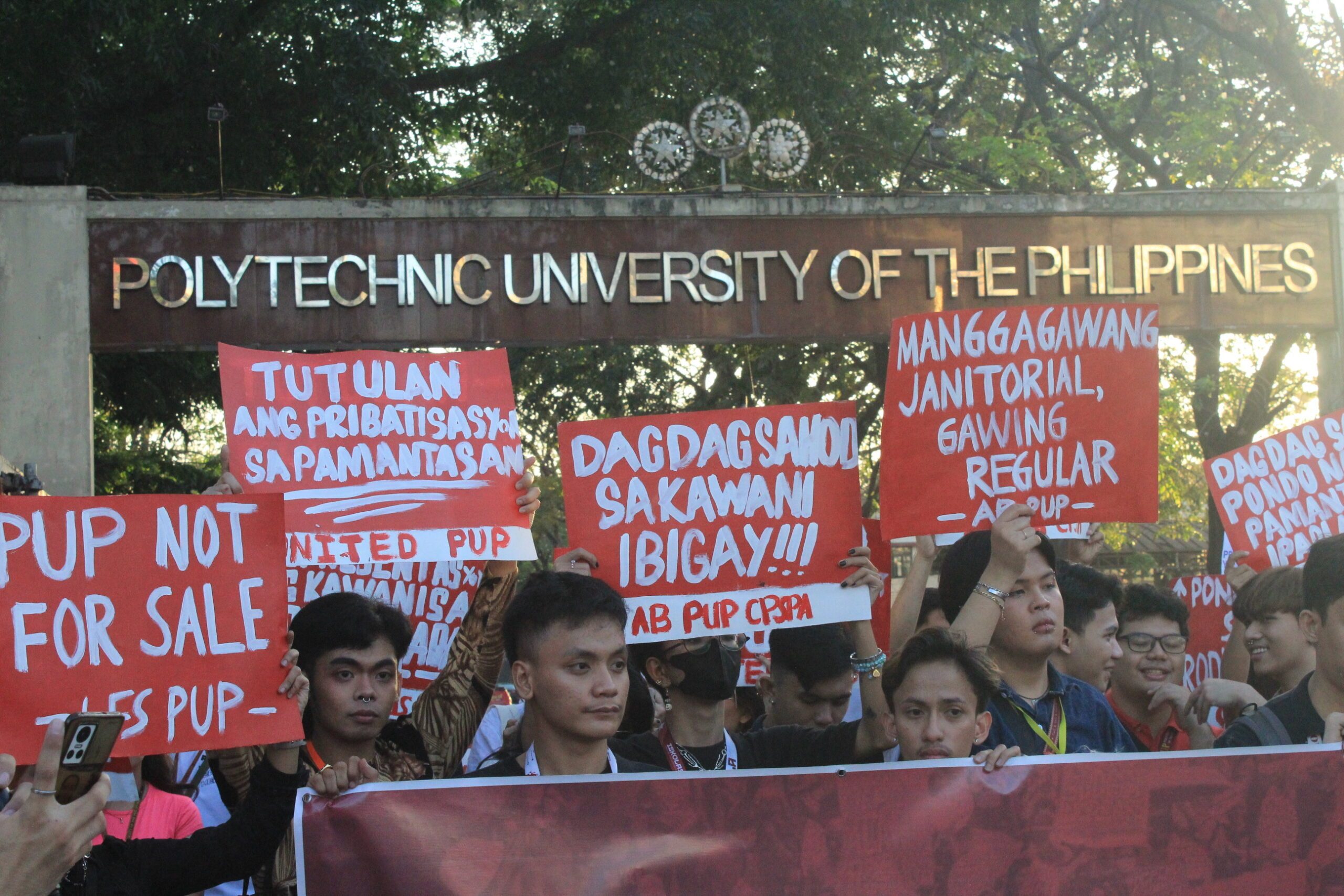SUMMARY
This is AI generated summarization, which may have errors. For context, always refer to the full article.

MANILA, Philippines – Polytechnic University of the Philippines students are protesting certain provisions in proposed bills seeking to amend the PUP charter which will pave the way for the privatization and commercialization of services inside the campus.
The students held protest actions following the February 12 House hearing on the proposed bills.
Under House Bill No. 8860, PUP’s governing board shall have the power and duty to enter joint ventures with business and industry for PUP’s profitable development and management of economic assets. It also allows privatization in managing non-academic services in the school including health, food, and building.
Sandigan ng Mag-aaral para sa Sambayanan (SAMASA PUP) chairperson Ronjay-C Mendiola told the House committee on higher and technical education, which is conducting hearings on the proposed bills, that the privatization may increase the prices of food and other products of stall concessionaires inside the main campus.
He said this will also affect student organizations who have to rent school venues for their events.
Baguio City Representative Mark Go, House panel chairman, explained that the proposed provision is a broad function for the governing board to exercise. This, he said, should be appreciated in the context of benefits for the whole university.
The lawmaker also argued that even if the national government has to allocate a budget for state universities like PUP, state universities also have to generate internal incomes and not just rely on the national government.
Mendiola told Rappler that the proposed provision will allow the government to “escape its responsibility” of prioritizing funds for state universities and colleges.
“Pinapatakas natin ‘yung government doon sa responsibility na sila dapat ang nagbibigay o tumutugon. ‘Pag umoo tayo na magkaroon ng income-generating projects, kung pipiliin ng university na magkaroon ng ganito, parang inaabswelto na natin ang government doon sa pag-mi-misprioritize nila ng budget,” Mendiola said.
(We’re allowing the government to escape its responsibility that it should be the one giving or addressing [funding]. If we allow the existence of income-generating projects, if the university will favor this, it would seem like we’re absolving the government of misprioritizing the budget.)
PUP student regent Miss Kim Modelo clarified that students support the other provisions in the bills, including the appropriation of an P8-billion budget for the university, which is higher than its P3-billion* budget for 2024. (*Editor’s Note: An earlier version of this story indicated a 6-billion budget; this has been corrected.)
Modelo also called for more consultation with PUP’s stakeholders, including teachers and non-teaching personnel, on the proposed bills.
During the hearing, PUP president Manuel Muhi reiterated that elevating the state university to a premier academic status will allow the school to address gaps in education and employment, design programs tailored for a modern work setting, and assist other polytechnic schools in the Philippines. It will also subsume various campuses that are currently funded by local government units.
Then-president Rodrigo Duterte vetoed the bill in 2019 due to “serious reservations.”
This is not the first time that joint ventures in state universities and colleges were criticized by stakeholders.
Republic Act No. 9500, which strengthened the University of the Philippines (UP) into a national university in 2008, vested the UP Board of Regents with the power to approve joint ventures.
On February 6, UP Diliman students protested the increasing commercialization of campus spaces in the national university. Various food stalls in the campus were told to end their operations in February to make way for the March opening of DiliMall, the former UP Shopping Center.
In January 2023, the Samahang Manininda sa UP Campus slammed the opening of the UP Diliman Gyud Food Hub, another avenue of concessionaires managed by private partners of UP, for not giving spaces for small campus vendors.
In a 2016 article, UP Diliman student publication Philippine Collegian reported that the Commission on Audit (COA) flagged the millions of unpaid obligations of Ayala Land for both the Technohub and the UP Town Center, which “deprived” the stockholders of benefits for the supposed additional funding. COA had directed UP to bill ALI for this. – Rappler.com
Chris Burnet Ramos is an Aries Rufo fellow. A graduating journalism student from PUP Manila, he currently writes for the progressive sector and the studentry as a senior news writer for PUP College of Communication’s The Communicator.
1 comment
How does this make you feel?
What group is going to benefit from this commercialization? The business sector, of course. I agree with Sandigan ng Mag-aaral para sa Sambayanan (SAMASA PUP) chairperson Ronjay-C Mendiola that this move will allow the government to “escape its responsibility” of prioritizing funds for state universities and colleges. Since when did the Government prioritize the student sector more than the business sector, especially when campaign fund donors and corrupt businesspersons are involved?